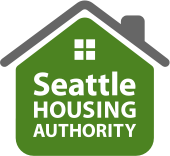SEATTLE — May 19, 2011 — In a unanimous decision at its May 17 meeting, the Seattle Housing Authority Board of Commissioners approved a sweeping plan for the redevelopment of the 30-acre Yesler Terrace Neighborhood.
Commission Chair John Littel praised the residents of the Yesler Terrace neighborhood for their involvement and commitment to the planning process. "Their commitment has really informed our work and has inspired our own commitment to make the best decisions we can," he said
Development Plan Components
The Development Plan provides a framework for redevelopment of the 70-year old public housing community on First Hill. It specifies maximum buildout on the site as follows:
|
Housing |
4.3 million square feet (up to 5,000 units) |
|
Office |
900,000 square feet |
|
Neighborhood services |
65,000 square feet |
|
Neighborhood retail |
88,000 square feet |
|
Parks & semi-private |
15.9 acres |
|
Parking |
up to 5,100 spaces |
Executive Director Tom Tierney noted that the the housing to be built at Yesler Terrace must serve future generations of low-income people. "Thousands of low-income residents will live in these units over the next 70 years," he said. "Our challenge is to balance their needs with the very immediate needs of the residents living here now. At the same time, we want to create a new neighborhood that will allow for significant growth in housing near downtown, near jobs and near services."
In a departure from earlier options studied, the Development Plan calls for the creation of an additional 100 extremely low-income housing units, bringing the total serving households earning less than 30 percent of Area Median Income to 661. These additional units will be built by nonprofit housing developers working with the Housing Authority to purchase land at a discount and receive ongoing subsidy through vouchers.
Seventy attend meeting; 20 offer comments
Around 70 people attended the Board of Commissioners meeting, which was held at the Yesler Community Center. Of the 20 people who offered comments on the plan, most were residents.
Residents were generally supportive of the redevelopment and appreciative of the efforts to involve them in the planning process. At the same time, many expressed fear about the difficulty of living at Yesler through the redevelopment process and the inevitable disruption to their lives. "We want to be able to return afterward, and we are worried about moving," said resident Nyu Vu, through an iterpreter.
Community Council President Kristin O'Donnell summarized resident concerns, stressing that current residents want to be able to come back to the new community soon, want new apartments ("not fixed-up ones in old buildings"), and would like to see as many apartments as possible replaced on the current site, rather than east of Boren Ave. "We want a priority on jobs for residents in redevelopment. We want to see job training for residents and support for home businesses, especially the day-care providers," she said.
Commissioners respond
Each of the six commissioners present offered comments on the plan and their decision. They expressed appreciation for the efforts of both stakeholders and staff, and recognition of the inherent disruption to resident lives with such an extensive project.
Commissioner Kollin Min noted that, "While we hear and recognize the concerns expressed here tonight, we are also hopeful about the promise contained within this redevelopment plan. We are looking to create an environment here that brings together all of the features that make a great neighborhood — the environmental conditions, the open space, the parks, the pedestrian connections, the proper balance of neighborhood amenities. We hope that this development plan lays out a bright vision for the future that we can all embrace."
Next steps
Along with the Development Plan, the Board of Commissioners also approved the Final Environmental Impact Statement and the Mitigation Measures that will be applied in response to the Final EIS. Housing Authority staff will begin working with a City Council "Committee of the Whole" to enact legislation that will coordinate redevelopment plans with zoning and other regulatory issues.
